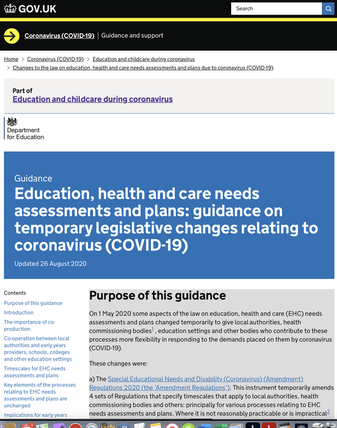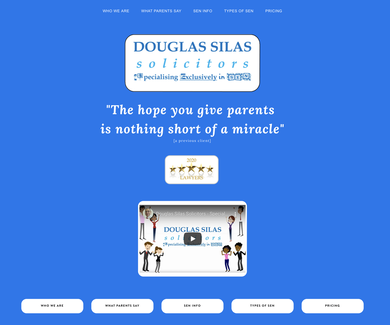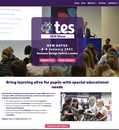|
by Douglas Silas
Specialist SEN solicitor
The first thing I usually say to you in my first SEN Update, at this time of year, is welcome back again after the summer break.
But this year I am only going to say welcome back again after the break! This is because I am very conscious this year that some people have been really on a ‘break’ since the end of March this year because of the Coronavirus/Covid-19 situation and I know that the year so far has been an extremely different and difficult one for everybody. It is also like we have accelerated our move into the digital world through this time! I sure that the current situation is going to continue for a while in one form or another and we are all going to have to adapt to the new ways we have had to find to do things. For my part, I am going to continue sending my SEN Updates out (but now in the second week of every new term/half-term on a Monday morning now, as opposed to a Friday, as I did with my weekly updates during the initial ‘lockdown’. I know how important it is to have a reliable/routine source of information available from someone you know that you can trust to tell you how it is! In this, my first SEN Update for the academic year 2020-21, you will find sections entitled:
As I always say, I know how busy everyone always is, so please feel free just to read the sections that are of interest to you or read everything; the choice is always yours.
Don’t forget, to ensure that you never miss out on one, you can get my SEN updates personally by completing your email details above, or by following me on one of the Social Media platforms that I use, which you will find on the right of this page.
You can also share this update with others (please only do so if it may be relevant to them), by using one of the icons usually to the right or at the bottom of this page.
GOVERNMENT UPDATES (EXTERNAL CHANGES)
You may have already seen the SEN Update that I sent out a week or so before schools went back called ‘Getting Back to School’, which referred to lots of Government guidance issued for those of you who needed it. Although there was a lot of guidance before, as things seem to be moving quite fast still, I would like to bring your attention to a few further things that have been sent out since by the Department for Education (DfE) here. These are very long and detailed sections, so please feel free to skip one or both of them if they do not concern you.
First, I would like to draw your attention to the Secretary of State’s announcement on 2/7/2020 about ‘Changes to the law and education, health and care needs assessments and plans due to Coronavirus (Covid-19)’ which was first issued on 30/4/2020 and updated on 26/8/2020, which you can find by clicking on the link which then refers to a couple of further links, which provide more detailed information.
The advice itself is entitled ‘Education, health and care needs assessments and plans: Guidance on temporary legislative changes relating to Coronavirus (Covid-19)’ and says as follows: ‘Purpose of this guidance On 1 May 2020 some aspects of the law on education, health and care (EHC) needs assessments and plans changed temporarily to give local authorities, health commissioning bodies1 , education settings and other bodies who contribute to these processes more flexibility in responding to the demands placed on them by coronavirus (COVID-19). These changes were: a) The Special Educational Needs and Disability (Coronavirus) (Amendment) Regulations 2020 (the ‘Amendment Regulations’). This instrument temporarily amends 4 sets of Regulations that specify timescales that apply to local authorities, health commissioning bodies and others: principally for various processes relating to EHC needs assessments and plans. Where it is not reasonably practicable or is impractical to meet that time limit for a reason relating to the incidence or transmission of coronavirus (COVID-19), the specific time limit (such as to issue a plan to someone eligible for one within 20 weeks of the initial request) in the regulations being amended will not apply. Instead, the local authority or other body to whom that time limit applies will have to complete the process as soon as reasonably practicable or in line with any other timing requirement in any of the regulations being amended (see Annex A: details of the amendments to the existing Regulations). These changes will come to an end on 25 September 2020, after which all the usual statutory timescales will come back into force. b) From 1 May to 31 July 2020, section 42 of the Children and Families Act 2014 (duty to secure special educational and health care provision in accordance with EHC plan) was modified by a notice from the Secretary of State for Education issued under the Coronavirus Act 2020. During this period, local authorities and health commissioning bodies were required to use their ‘reasonable endeavours’ to discharge this duty. To help ensure that children and young people receive the support they need to return to school, we will not be issuing further notices to modify this duty unless the evidence changes. This guidance provides a summary of the legislative changes described in paragraph (a) above and sets out the key implications for all those who play a part in the processes relating to EHC needs assessments and plans. It is intended to help those with statutory duties relating to SEND to understand how the temporary changes to the law affect them and how to discharge any duties that have been amended. It also sets out our expectations over how EHC needs assessment and plan processes should be managed if there are likely to be cases still in progress when the Amendment Regulations expire on 25 September where the coronavirus exception has been used. This guidance is non-statutory. All decisions must be made on the facts of the case and the interpretation of legislation is ultimately a matter for the Courts. The target audience for this guidance is: · families and parent carer forums · SEND Information, Advice and Support Services (SENDIASS) · local authorities (both their SEND and social care services, at a strategic and operational level) · health commissioning bodies (again, at both strategic and operational level) · early years providers, schools, colleges and other education settings · others who contribute advice and information to EHC needs assessments, such as educational psychologists and other health care professionals · mediation advisers This guidance also confirms which key elements of the processes over EHC needs assessments and plans are unchanged. Notably this includes that a local authority must: · still consider requests for a new EHC needs assessment · still secure all of the required advice and information in order to be able to issue a plan · have regard to the views and wishes of a child, the child’s parent or a young person when carrying out its SEND functions under the Children and Families Act 2014 (‘the 2014 Act’) Given that the changes to legislation are temporary, we will not be updating the statutory guidance, the SEND code of practice: 0 to 25 years. We recommend that anyone referring to the SEND code of practice about EHC needs assessment and plan processes that are operational between now and 25 September also reads this guidance. It is also important to refer to the Amendment Regulations for the full detail of the changes. This document is part of delivering on our ongoing commitment to ensuring that children and young people with complex needs are supported effectively during this national health emergency. As such, it sits alongside the autumn term guidance for: · early years and childcare providers · mainstream schools · special schools and other specialist settings · further education (FE) colleges and providers The autumn term guidance provides information on steps these settings will need to take to ensure children and young people with SEND can return to full-time provision.’
I also referred previously to the ‘Guidance for full opening: special schools and other specialist settings’ in my previous email, but this guidance was updated last week on 8/9/2020 and the email I received the next day from the DfE said as follows:
‘We would like to draw your attention to an updated version of the Guidance for full opening: special schools and other specialist settings to reflect the actions special schools and other specialist settings need to take to support full opening from the start of the autumn term. The main updates are listed at the start of the document and include:
• changes to SEND legislation • use of face coverings in settings • the framework for supporting transport to and from settings • pupils who are shielding or self-isolating • actions for all schools and local authorities with regards to recording attendance and absence • employer health and safety and equalities duties • support available for schools with regard to supply teachers • performance management and appraisal for teachers • health and safety • music, dance and drama in school • wraparound provision and extra-curricular activity • physical activity in schools • new resources available for pupil wellbeing and support • behaviour expectations • primary assessment • additional resources available for delivering remote education • health and safety risk assessments for those with an EHC plan AGPs The government is committed to a full return to school for all pupils. There are a small number of children with complex needs that require AGPs to be undertaken where risks need to be carefully managed in the context of the pandemic and we are aware of the concerns being raised around this issue. Schools, health and local authority partners need to work together on how the current guidance applies in their setting and to the specific children they are working with in order to enable them to return to school safely. We have heard examples of good practice locally and are working with PHE and NHSE to establish whether any changes to the guidance or further information about practice principles are needed. It is important that schools communicate clearly with parents on progress towards supporting children who need AGPs to return to school safely.’
There have also been further developments in terms of education, so I would also draw your attention to a letter sent out by Vicky Ford, the parliamentary Undersecretary of State for Children and Families, addressed to children and young people with special educational needs (SEND), their families and carers and those who work to support them. The email that I received, which I was asked to share as widely as possible, said:
‘The letter provides advice and guidance on several issues, including behaviour, risk assessments, face coverings, specialist and visiting practitioners, mental health and well-being, aerosol generating procedures and hospital schools, as well as linking to some of the support available to help’, The letter itself states: ‘As minister with responsibility for special educational needs, I wanted to write to you about support for children and young people with special educational needs and disabilities (SEND) to return to school. Return to school I am extremely grateful to those working in schools and colleges for the preparations they have made to ensure all children and young people can get back into the classroom, with many returning for the first time since March. I recognise that for children and young people with SEND, and their families and carers and those who work tirelessly to support them, this is a particularly challenging and anxious time. Returning to education is vital for the education of all children and for their wellbeing – time out of school is detrimental for children’s development, particularly for disadvantaged and vulnerable children. All children and young people value the structure and routine of regular attendance as well as the support and strong positive relationships provided by their school or college. It is critical that all children can one again benefit from a full time five day a week on-site education. I do recognise, though, that the return to school may be more difficult for some children and young people, particularly those who have had to shield, received their education remotely without full access to specialist support, or been exposed to a range of adversity and trauma including bereavement, anxiety and in some cases increased welfare and safeguarding risks. Schools and colleges should work with children and young people with SEND and their families and carers so that they receive the education, therapeutic/specialist support, and reasonable adjustments that they need. The prolonged period of absence from schools and colleges may contribute to disengagement with education upon return to school, resulting in anxiety which could lead to increased incidence of poor behaviour. School leaders should be mindful that disruptive behaviour might be the result of unmet educational or other needs and consider whether a multiagency assessment is necessary. The Whole School SEND (WSS) Consortium have produced a handbook to support educational professionals to successfully re-engage pupils with learning after a period of disruption. They have also produced a COVID-19 SEND Review Guide to help schools reflect on their provision before September and a leaflet to support families and carers ask questions to schools to support successful returns. These resources are available on the SEND Gateway and webinars are hosted on WSS’s YouTube page shortly after being delivered. Details of future training sessions are held on the events page of the SEND Gateway. You can opt to join Whole School SEND’s community of practice when you sign up for an event to receive notifications about future training and resources as they are published. Behaviour policies To assist all school leaders and staff in welcoming back all pupils, we have developed a tool for mainstream schools to support the re-engagement of pupils. To further support schools, our full opening guidance advises that schools and specialist settings should update their behaviour policy to reflect the new protective measures, as well as any new rules and routines. In the event that a pupil’s behaviour warrants disciplinary action, the normal rules apply and the disciplinary powers, including exclusion, that schools currently have remain in place. Permanent exclusion should only be used as a last resort and must be lawful, reasonable, and fair. Where a child with a social worker is at risk of exclusion, their social worker should be informed and involved in relevant conversations. Any disciplinary exclusion of a pupil, even for short periods of time, must be consistent with the relevant legislation. Headteachers should, as far as possible, avoid permanently excluding any pupil with an Education, Health and Care Plan. Pre-empting that a pupil may commit a disciplinary offence, and thus not allowing a pupil to attend school is an unlawful exclusion. Ofsted will continue to consider exclusions, including the rates, patterns and reasons for exclusion and to look for any evidence of off-rolling. Off-rolling is never acceptable. Ofsted is clear that schools placing pressure on parents to remove their child from the school (including to home educate their child) is a form of off-rolling. Elective Home Education should always be a positive choice taken following a discussion between parents the school, and the local authority about how the needs of the child might best be met. This is particularly important where vulnerable children, children in need, and those at greater risk of harm are involved. Risk assessments It may be necessary to undertake individual risk assessments to understand the level of additional support a child or young person may need. These can help reassure pupils, families and carers, and staff that it is safe for the pupil to be welcomed back to school. Risk assessments should inform a plan of action which focuses on supporting attendance and engagement and identifies what additional support children and young people need to make a successful return to their full time education. Such an assessment would also be useful if children and young people have to self-isolate or if a local outbreak of Covid-19 requires a school or college to return to more limited attendance. Face coverings To provide further reassurance, we have also updated our guidance on face coverings. Schools and colleges will have the discretion to require face coverings in indoor communal areas where social distancing cannot be safely managed, if they believe that it is right in their particular circumstances. In areas of national government intervention where the transmission of the virus is high, in education settings where Year 7 and above are educated, face coverings should be worn by adults (staff and visitors) and pupils when moving around indoors, such as in corridors and communal areas where social distancing is difficult to maintain. However, we have been clear that some individuals are exempt from wearing face coverings, including people who cannot put on, wear or remove a face covering because of a physical or mental illness or impairment or disability or people who are speaking to or providing assistance to someone who relies on lip reading, clear sound or facial expression to communicate. The same exemptions will apply in education settings, including for staff providing specialist interventions and therapies, and we would expect teachers and other staff to be sensitive to those needs. More information on face coverings can be found here. Specialist and visiting practitioners Settings should minimise the number of visitors where possible, however, visiting specialists such as therapists, clinicians, peripatetic teachers and other support staff for pupils with SEND should provide interventions as usual, including moving between settings as required. Visitors may also include NHS staff, such as those delivering vaccinations as part of the national childhood immunisation programme, which are essential for children’s health and wellbeing. Such specialists will be aware of the PPE most appropriate for their role. Mental health and wellbeing There will be some children and young people with SEND who will return to school with additional social, emotional and mental health needs. NHS mental health services remain open and have adapted to provide ongoing support to children and young people who need it. NHS mental health trusts are ensuring ongoing access to 24/7 crisis lines to support people of all ages. The Wellbeing for Education Return programme will provide £8 million of funding, training, and resources for local authorities to equip education staff with resources, training and ongoing advice and support to promote children and young people’s wellbeing and mental health. This will link to and include resources sensitive to and supportive of children and young people with SEND. Aerosol generating procedures There are a small number of children with complex needs that require aerosol generating procedures (AGPs) to be undertaken. Schools, health and local authority partners need to work together on how the current guidance applies in their setting and to the specific children they are working with in order to enable them to return to school safely. We have heard examples of good practice locally and are working with PHE and NHS England to establish whether any changes to the guidance or further information about practice principles are needed. It is important that schools communicate clearly with parents on progress towards supporting children who need AGPs to return to school safely. Hospital schools There may be other reasons where any child or young person may be absent from school, including those with SEND. Where children and young people are receiving hospital education on hospital sites then should continue to be supported, including through remote learning support as necessary, to minimise the impact of their hospital stay on their education. Once again, we would like to thank you for the hard work that you have done to prepare for the full return of children and young people for the new school year. Yours sincerely, Vicky Ford MP Parliamentary Under-Secretary of State for Children and Families’
I hope that this helps people.
MY UPDATES (INTERNAL CHANGES)
I have also made a few internal changes to things to try and help people. You may have noticed that our website now has a more clear and simplistic approach, which I hope you will find much easier to navigate and find information on that you may need. For example, I have put all of these SEN Updates into an easily navigable page simply called ‘SEN Updates’ and have also tried to categorise my updates so that you can search for topics more easily if you need to. You can now also sign up to get one of my (free) email courses entitled: ‘A Guide to SEN’, ‘How to Win a SEN Tribunal Appeal’ or to just get these regular ‘SEN Updates’ on every page and I have also made it easier to find our video cartoons/SEN FAQs which help explain things to people. Additionally, I have updated my Guide to the SEND Code of Practice for the academic year 2020-21, which is available (again free) to read on theKindle bookstore. I hope that this also helps people.
FORTHCOMING SEN EVENTS
In my updates, I always like to try to draw people’s attention to some forthcoming SEN events which I think may be of interest to them. I actually talked about this in my Update on 13/7/2020 called ‘Dates For Your Diary’. Unfortunately, many of the things that I usually refer to are not available at the moment, because of the restrictions currently in place, and some have now been put back again, so I will just highlight the same things as follows:
IT ALL SEEMS TO HAVE GONE VIRTUAL NOW! As I am physically disabled and quite vulnerable myself as a wheelchair-user, I have to be very careful because, so personally have not even ventured out of my front door more than once in the past six months (don’t worry, I know that this thing will eventually pass). But I and many people have very quickly got very used to doing things virtually and have even actually enjoyed being able to work from home and to have more time now to be able to see more of my family. Although some restrictions have been lifted (although some have also recently been put back in place), ‘holidays’ this year for many people were very different from how they have been in previous years. I knew that I would not be able to leave my home, but I still took a week’s holiday in August with my wife, Erica, and we visited many places around the globe ‘virtually’. We actually visited many places that I would never be able to go to in real life, because of my accessibility requirements and we also visited lots of places that we could never do in just a week’s holiday. For example, we visited the Taj Mahal in India one day, to the Great Barrier Reef and a lot of Australian cities like Sydney, Melbourne, Canberra the next; then to Tokyo in Japan, to the Grand Canyon, Niagara Falls, the Colorado Plains, Death Valley in America; then to the Pyramids in Egypt. In fact, we even saw the Northern Lights in Norway, the Colosseum in Rome, Mexico, Alaska and there were other places too. Phew! I cannot believe now that we saw so much in just a week! And whilst doing this virtually, my mind was taken back to the time that we physically visited Amsterdam a couple of years ago. We had booked tickets to visit the Anne Frank museum. When we got there though, it was explained to us that, as a wheelchair user, I would not be able to do the tour, as it required a lot of climbing up quite steep steps. However, I was told that I could do the tour ‘virtually’ through a virtual reality headset being put on me in the cafeteria. This was the first time that I had ever used a virtual reality headset and I found the whole experience quite amazing. It must have been very funny for people to watch me in the cafeteria constantly turning my head around from right to left, to see everything that I wanted. When Erica returned after having done the physical tour, we compared our experiences. I was then very amused to find that I had actually visited a lot of places virtually, that she had been unable to on the tour physically because they had been sectioned off to protect them. You see, sometimes doing something virtually, can actually be better than doing it for real itself! As I said in the title of this update, ‘The Times They Are A-Changin’. With best wishes Douglas
How useful do you find my SEN Updates?
Created with Quiz Maker
Comments are closed.
|
Archive
March 2022
|
© Douglas Silas Solicitors 2005-24
Authorised and Regulated by the Solicitors Regulation Authority (SRA no: 643718)
‘Douglas Silas Solicitors’ is the trading name of ‘Douglas Silas Solicitors Limited’, a limited company registered in England & Wales (company no: 10689991), whose registered office is Gable House, 239 Regents Park Road, Finchley, London, United Kingdom, N3 3LF. A list of members/directors may be inspected at our office.
Authorised and Regulated by the Solicitors Regulation Authority (SRA no: 643718)
‘Douglas Silas Solicitors’ is the trading name of ‘Douglas Silas Solicitors Limited’, a limited company registered in England & Wales (company no: 10689991), whose registered office is Gable House, 239 Regents Park Road, Finchley, London, United Kingdom, N3 3LF. A list of members/directors may be inspected at our office.








 RSS Feed
RSS Feed







